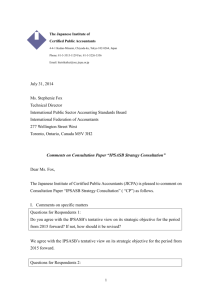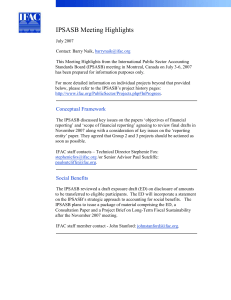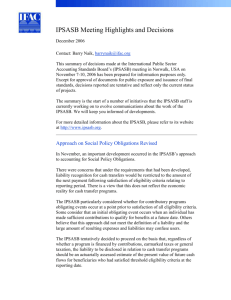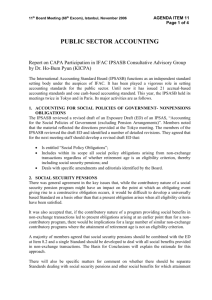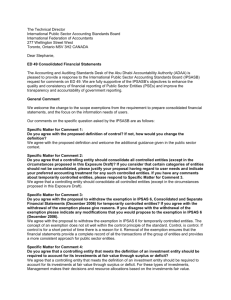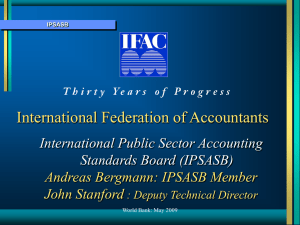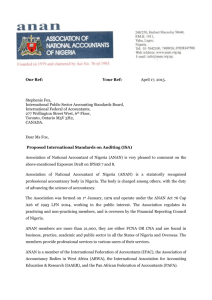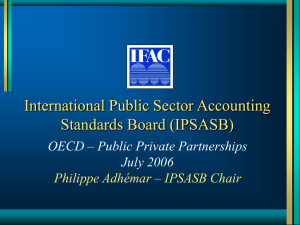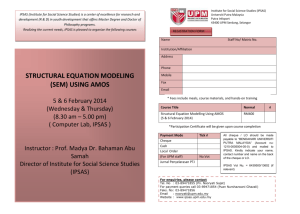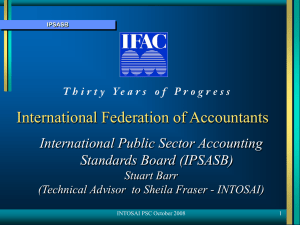IPSASB Developments
advertisement
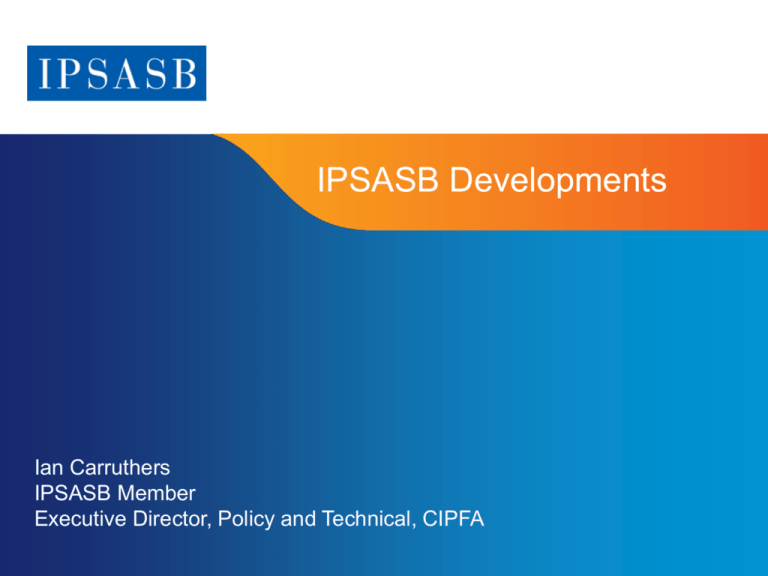
IPSASB Developments Ian Carruthers IPSASB Member Executive Director, Policy and Technical, CIPFA IPSASB Developments • • • • Conceptual Framework – October 2014 Strategy and Work Plan 2015-2019 First Time Adoption (IPSAS 33) – January 2015 Accounting for Interests in Other Entities (IPSASs 34 – 38) – January 2015 • RPG3 - Service Performance Reporting – March 2015 CF Preface: Characteristics of the Public Sector Statistical Reporting Regulatory Role Nature & Purpose of Assets & Liabilities NonExchange Transactions Approved Budget Nature & Longevity of Public Sector CF Chapter 1: Role and Authority of the Conceptual Framework Role • Concepts underpinning general purpose financial reporting • Accrual Basis Authority • No authoritative requirements • No override of requirements of International Public Sector Accounting Standards™ (IPSASs™) or Recommended Practice Guidelines (RPGs) CF Chapter 2: Objectives and Users • Objectives of Financial Reporting – Provide information about entity useful to users of GPFRs – Accountability purposes and decision-making purposes – Reflects service delivery objective and nature of funding – Respond to information needs of users • Users of GPFRs – Primary users: service recipients and resource providers CF Chapter 3: The QCs Relevance Faithful Representation Understandability Timeliness Comparability Verifiability CF Chapter 4: The Reporting Entity • Government or other public sector organisation, program or identifiable area of activity that prepares GPFRs • Key characteristics – Raises or uses resources from / on behalf of constituents; and – Service recipients or resource providers dependent on GPFRs • May comprise two or more separate units / organisations • Separate legal identity not essential CF Chapter 5: Defined Elements Asset Liability Revenue Ownership Contributions Expense Ownership Distributions CF Chapter 5: Net Financial Position / Other Economic Phenomena • Recognition of economic phenomena not captured by elements definitions potentially necessary • IPSASs could require or allow recognition of resources or obligations not satisfying element definitions: – ‘other resources’ (deferred inflows at ED stage) – ‘other obligations’ (deferred outflows at ED stage) • Net financial position instead of Net Assets = difference between assets and liabilities after adding other resources and deducting other obligations. CF Chapter 6: Recognition – The Criteria Item Satisfies Definition of an Element Can be Measured in a way that: • Achieves QCs • Takes account of Constraints Not Incorporated in Element Definitions CF Chapter 7: Measurement • Measurement Objective: ‘to select those measurement bases that most fairly reflect the cost of services, operational capacity and financial capacity of the entity in a manner that is useful in holding the entity to account, and for decision-making purposes’ • No single measurement basis (or group of bases) identified Asset Liability Historical Cost Current Value Market value Cost of fulfillment Replacement cost Market value Net selling price Cost of release Value in use Assumption price CF Chapter 8: Presentation Information Selection Information Location Information Organization IPSASB CF Compared to the IASB IPSASB IASB Role Concepts that underpin general purpose financial reporting; does not override standards Concepts that underlie the preparation and presentation of financial statements; does not override standards Scope General purpose financial reports (GPFRs) 1989 Framework – relates to financial statements – 2010 Framework sections refer to GPFRs Objective Financial information - useful for accountability and decision-making purposes. Users service recipients and resource providers Financial information - to provide investors, lenders and other creditors making decisions about providing resources to the entity Qualitative Characteristics Definitions very similar to IASB Framework; no split between fundamental and enhancing characteristics Split between fundamental and enhancing characteristics Elements Definitions similar Net financial position & “other economic phenomena” Definitions similar; tentative decisions on “economic resources” Measurement Measurement objective “Fair Value” not identified as measurement basis. Tentative decision – no measurement objective (factors to consider when selecting a measurement basis) Reporting IPSASB principles for information selection, location and organisation in broader GPFRs Discussion paper and exposure draft has/is anticipated to include a new chapter on presentation and disclosure IPSASB Strategic Objective 2015 Strengthening public financial management and knowledge globally through increasing adoption of accrual-based IPSASs by: • Developing high-quality public sector financial reporting standards; • Developing other publications for the public sector; and • Raising awareness of the IPSASs and the benefits of their adoption. Ongoing projects • Public Sector Combinations • Government Business Enterprises • Public Sector Specific Financial Instruments • Emissions Trading Schemes – collaboration with IASB • Social Benefits – project re-started Work Plan 2015-2019 Balancing development and maintenance “must-do” projects 2015-2019 • Non-exchange expenses; • Revenues – exchange and non-exchange; • Measurement – public sector specific; • Heritage assets; and • Infrastructure assets. existing IPSASs which need maintaining • Employee benefits; • Leases • Annual improvements • Cash Basis IPSAS Accounting for Interests in Other Entities In January 2015 the IPSASB issued: • IPSAS 34 Separate Financial Statements • IPSAS 35 Consolidated Financial Statements • IPSAS 36 Investments in Associates and Joint Ventures • IPSAS 37 Joint Arrangements • IPSAS 38 Disclosure of Interests in Other Entities Features: • Based on IFRS equivalents • Different terminology, including relevant public sector illustrations • Clarifications on the applicability of the Standards to accounting by public sector entities. Questions Discussion & Further Information • Visit our webpage http://www.ipsasb.org/ • Or contact us by e-mail: Chair IPSASB: andreasbergmann@ipsasb.org Technical Director: stepheniefox@ipsasb.org Page 18
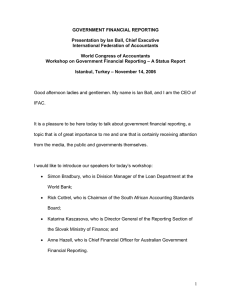
![Strategic Report * [Insert Board/Committee Acronym here]](http://s3.studylib.net/store/data/009757854_1-7855a7d89bd9fbeb299750104722b602-300x300.png)
